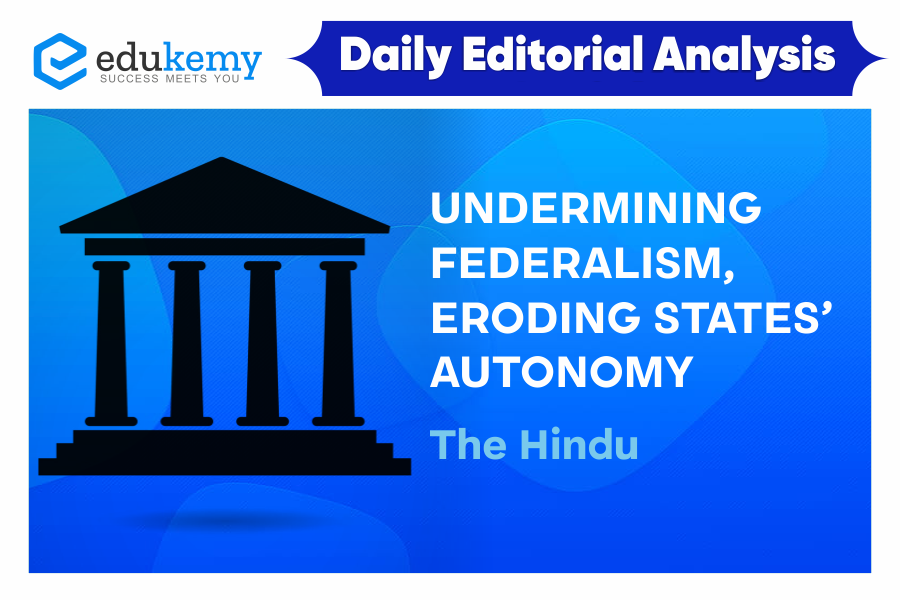
In recent times, there has been a growing concern over the erosion of federalism and the diminishing autonomy of states. This trend is often attributed to centralizing tendencies that concentrate power at the national level, undermining the principles of a federal system. The balance of power between the central government and the states is crucial for maintaining a healthy democracy, ensuring responsiveness to local needs, and fostering diversity. A departure from this equilibrium can lead to a concentration of power, potentially diminishing the ability of states to make decisions that best suit their unique circumstances. This issue poses significant challenges to the cooperative and collaborative spirit that federal systems aim to foster, requiring careful attention and consideration to maintain a harmonious and effective governance structure.
Exam View:
Prelims:
Current events of national importance (Federalism, NITI Aayog, off-budget borrowing etc
Mains GS Paper II & III:
Functions and responsibilities of the union and the states, issues and challenges pertaining to the federal structure etc
In News:
Rather than strengthening cooperative federalism, the central government of the day is resorting to policies that make the Indian Federation coercive.
Federalism is a system of government where the powers are divided equally between the Centre and its various parts, including provinces and states. Federalism is one of the pillars of the Basic Structure of the Constitution.
The Planning Commission was replaced by NITI Aayog in 2015 with an emphasis on the ‘Bottom–up’ approach and to achieve Sustainable Development Goals (SDGs). One of the main mandates of NITI Aayog is to foster cooperative federalism through structured support initiatives and mechanisms with the States continuously, recognizing that strong States make a strong nation.
Cooperative vs Competitive Federalism:

Constitutional Provisions:
- Article 1: “India, that is Bharat, shall be a Union of States”. While the Constitution doesn’t mention the term “federal”, it does provide for a governance structure primarily federal in nature.
- Articles 245 to 254: The legislative functions of unions and states are discussed mainly in Articles 245 to 255 in Part XI of the Constitution.
- Article 246 (Seventh Schedule): It demarcates the powers of the Union and the State by classifying their powers into 3 lists. They are the Union List, State List, and Concurrent List.
Recommendations of Finance Commission rejected by Union Government:
- The Fifteenth Finance Commission report: It recommended a special grant to three States to ensure that the tax devolution in 2020-21 in absolute terms should not be less than the amount of devolution received by these States in 2019-20.
- Recommendation relating to grants for nutrition: amounting to ₹7,735 crore was not accepted.
- The sector-specific grants and State-specific grants: It recommended by the Finance Commission for the period 2021-26, have not been accepted.
Impacts of Rejecting Recommendations:

Way Forward:
Different Committees appointed by the Government of India emphasized the need to curtail the number of Centrally Sponsored Schemes (CSS) and restrict them to a few areas of national importance. The Sub-Committee of Chief Ministers appointed by NITI Aayog has recommended a reduction in the number of schemes and the introduction of optional schemes.
The COVID-19 pandemic has taught us that individual efforts are not enough to tackle national exigencies, and there is a constant need to strengthen and renew the cooperative spirit of Indian federalism.
The center and state should work together in accordance with their constitutional mandates, with greater autonomy for states. After all, a stronger nation results from these stronger states.
Daily Newsletter – Get all your Current Affairs Covered – Click Here
Frequently Asked Questions (FAQs)
FAQ 1: What is federalism, and why is it important in the context of governance?
Answer: Federalism is a system of government in which power is divided between a central authority and individual constituent units, such as states or provinces. It is crucial because it allows for a distribution of power, preventing the concentration of authority in one entity. This ensures a balance, safeguards against potential abuses, and accommodates diverse regional interests within a country.
FAQ 2: How does undermining federalism impact the autonomy of states?
Answer: Undermining federalism diminishes the autonomy of states by concentrating power at the central level. This can result in a reduction of states’ ability to make decisions that directly affect their citizens. States lose the flexibility to address unique local issues, respond to regional needs, and formulate policies tailored to their specific circumstances.
FAQ 3: What are the potential consequences of eroding states’ autonomy?
Answer: Eroding states’ autonomy can lead to a host of issues, including a weakening of democratic principles, stifling of local innovation, and decreased responsiveness to regional challenges. It may also contribute to a sense of alienation among citizens who feel their local concerns are neglected in favor of centralized decision-making.
FAQ 4: How can federalism be strengthened to protect states’ autonomy?
Answer: Strengthening federalism involves upholding the principles of decentralization, respecting the constitutional division of powers, and promoting intergovernmental cooperation. It requires a commitment to open dialogue between the central government and states, ensuring that policies are crafted collaboratively, taking into account the unique needs and perspectives of each region.
In case you still have your doubts, contact us on 9811333901.
For UPSC Prelims Resources, Click here
For Daily Updates and Study Material:
Join our Telegram Channel – Edukemy for IAS
- 1. Learn through Videos – here
- 2. Be Exam Ready by Practicing Daily MCQs – here
- 3. Daily Newsletter – Get all your Current Affairs Covered – here
- 4. Mains Answer Writing Practice – here


